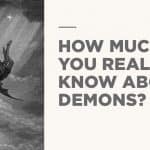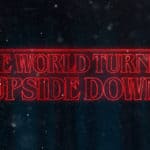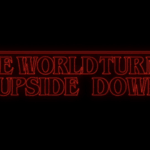
As familiar as the subject matter of demons might seem, Demons: What the Bible Really Says about the Powers of Darkness will surprise you. Most readers will expect a lot of discussion on Satan, demons, and the “principalities and powers” of Paul’s writings. We’ll certainly cover those subjects, but I need to prepare you at the outset that a good bit of what you’ll read in this book about those (and other) divine enemies of God will not conform to what you’re already thinking. There will be material in here that you’ve never heard in church or perhaps even in a seminary class.
Overcoming contextual obstacles
I’m announcing this at the outset because, when I decided to write this book, I did so despite knowing that there were serious obstacles to overcome. To be blunt, Christians embrace a number of unbiblical ideas about the powers of darkness. The reasons are twofold and are related. First, most of what we claim to know about the powers of darkness does not derive from close study of the original Hebrew and Greek texts. Second, much of what we think we know is filtered through and guided by church tradition—not the original, ancient contexts of the Old and New Testaments.
Taken collectively, these two realities mean that our beliefs about Satan and the dark powers are not rooted in these powers’ own original contexts. Bible teachers (including some scholars) are prone to write about the powers of darkness on the basis of English translation. That undermines the nuance found in the original languages. Substituting traditions that merged after the biblical period for ancient context and conflating ancient-language terms into the vocabulary of English translations produces an incomplete and occasionally misleading portrait of the supernatural forces hostile to God and his children. As a step toward rectifying this situation, this book seeks to root a theology of the powers of darkness in the original text, understood on the text’s own terms.
You might be wondering what sort of unbiblical ideas I’m referencing. A few illustrations will suffice. Most English translations use the term “demon” three times in the Old Testament (Lev 17:7; Deut 32:17; Ps 106:37). Christian readers might wonder why demons are mentioned so infrequently in the Old Testament compared to the New Testament Gospels. But that very question erroneously presumes that the “demons” of the Old Testament are the same as those encountered in the gospels. They are not. Another assumption is that the śaṭan figure of Job 1–2 is the devil of the New Testament. That conclusion is not feasible exegetically. Another example is the oft-repeated belief that Satan and one-third of the angels of heaven rebelled against God before the creation of humankind. This idea is prevalent throughout Christian tradition despite the fact that such an episode appears nowhere in the Bible. The only passage that comes close is Revelation 12:4, a passage dealing with the birth of the Messiah, thousands of years after the primeval period.
Aside from certain assumptions reflexively brought to our study, there is also the issue of what we mean by “darkness” and, by extension, the “powers” of that darkness. As with the terminology for hostile supernatural powers, the meaning of “darkness” isn’t self-evident. While it is obvious that the literal physical circumstance of the absence of light is not in view, considering what the Bible seeks to communicate by its references to darkness matters for framing what it says about certain supernatural powers. In Scripture, darkness is a metaphor for negative, fearful human experiences. There are roughly two hundred references to darkness in Scripture, nearly all of which are used as a contrast to the God of the Bible—the source of love and life. It is no surprise, then, that death, the threat of death, and the realm of the dead itself are linked to supernatural entities expelled from God’s presence and service.
My hope is that Demons: What the Bible Really Says about the Powers of Darkness will not only demonstrate why reading the Bible in its own context matters, but how doing so can lead to the excitement of rediscovering Scripture.

This post is adapted from Demons: What the Bible Really Says about the Powers of Darkness by Michael S. Heiser (Lexham Press, 2020).






